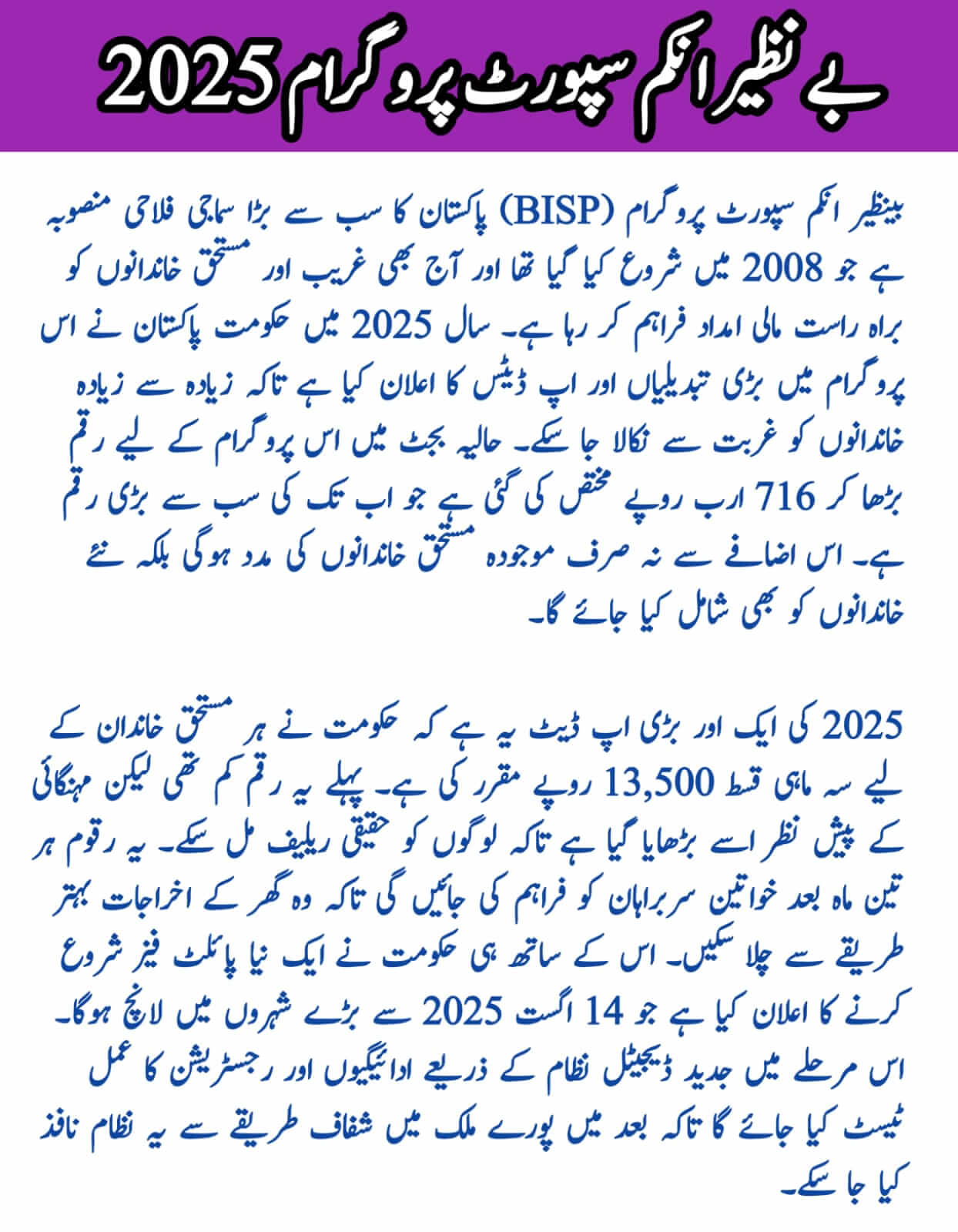The Benazir Income Support Programme (BISP) remains one of the most influential social welfare initiatives in Pakistan. Established in 2008, it continues to provide direct cash assistance to millions of vulnerable families across the country. In 2025, the Government of Pakistan announced significant updates to expand the program, increase the financial aid, and introduce new initiatives under the banner of BISP. These developments aim to support low-income households, empower women, and create pathways toward economic stability.
This article provides a comprehensive guide on the BISP 2025 updates, including eligibility requirements, registration procedures, payment distribution methods, and government strategies to ensure transparency and efficiency.
Key Highlights of BISP in 2025
- Budget Expansion:
For the fiscal year 2025-26, the BISP budget has been increased to PKR 716 billion, reflecting the government’s commitment to expanding financial support for poor families. - Increased Stipends:
Beneficiaries are now expected to receive higher quarterly stipends, with payments rising to PKR 13,500 per eligible household. - Pilot Phase Expansion:
A pilot phase has been announced starting August 14, 2025, across selected major cities. This initiative will test advanced digital monitoring and payment systems before rolling them out nationwide. - Skills Development:
Under the Benazir Hunarmand Programme, more than 3,000 beneficiaries will receive vocational and professional training to enhance job opportunities and reduce dependence on financial aid. - Digital Payment System:
A stronger digital mechanism will be introduced to ensure transparency, prevent fraud, and make payments easier through ATMs, mobile wallets, and banks.
Benazir Income Support Programme and Purpose of BISP
BISP was launched in 2008 during the tenure of former Prime Minister Yousaf Raza Gillani and was named after the late Prime Minister Benazir Bhutto. The program was designed to alleviate poverty by providing unconditional cash transfers to the poorest segments of society. Over time, the initiative expanded with complementary programs, including women’s
- Benazir Nashonuma Programme (nutrition for mothers and children)
- Benazir Taleemi Wazaif (education stipends for children)
- Benazir Kafalat Programme (cash support for women)
- Benazir Hunarmand Programme (skills development and training)
The central objective has always been poverty alleviation, women’s empowerment, and social protection.
Benazir Income Support Programme BISP 2025 Eligibility Criteria
To qualify for the program in 2025, applicants must meet the following conditions:
- Belong to a low-income household verified by the National Socio-Economic Registry (NSER).
- Not be a government employee or receive a pension/fixed income from public institutions.
- Possess a valid CNIC (Computerized National Identity Card).
- Be a woman from the family (priority is given to female heads of households).
- Monthly household income should be below PKR 25,000–30,000.
Registration Process for BISP 2025
The registration process has been made simpler and more transparent. Here are the steps:
- Visit the BISP Registration Center: The nearest BISP or Ehsaas Program office is available in every district.
- Provide CNIC and Family Data: Women must bring their CNIC and details of household members.
- Biometric Verification: Conducted through NADRA systems.
- SMS Verification: After registration, eligible families receive a confirmation message from 8171.
- Payment Collection: Once confirmed, beneficiaries can collect payments via designated banks, ATMs, or retail agents.
New Features Introduced in 2025
- Digital NSER Survey:
A digital survey ensures updated records of poor families for accurate eligibility. - Quarterly Payments:
Increased payments (PKR 13,500) will be disbursed every three months. - Women-Centric Policies:
Female beneficiaries continue to remain at the center of BISP, strengthening household financial management. - Collaboration with Banks and Mobile Wallets:
Payments are now easier through JazzCash, Easypaisa, and HBL Konnect, reducing long queues at centers. - Monitoring Through AI Systems:
The program uses artificial intelligence to detect fraud and duplication and ensure fairness.
Impact of BISP on Society
The BISP program has had a profound impact on millions of lives in Pakistan. Key areas of improvement include:
- Reduction in Poverty: Cash transfers provide immediate relief to poor households.
- Women Empowerment: Women beneficiaries gain control over finances, improving household decision-making.
- Education and Health: Complementary programs support children’s schooling and maternal health.
- Employment Opportunities: With the addition of skills programs, families can move toward long-term financial independence.
Challenges Faced by BISP
Despite its achievements, BISP also faces challenges that need addressing:
- Fraudulent Claims: Some ineligible families attempt to enroll.
- Political Influence: Criticism regarding misuse for political gains.
- Digital Divide: Many rural families lack access to mobile phones and the internet for digital systems.
- Capacity Issues: The program needs continuous improvement to handle millions of beneficiaries efficiently.
Future Outlook
With the budget expansion in 2025, BISP is expected to:
- Reach over 12 million families nationwide.
- Strengthen integration with digital banking platforms.
- Increase transparency through real-time monitoring.
- Launch new initiatives for nutrition, health, and skill development.
This forward-looking approach suggests that BISP will continue to play a vital role in reducing poverty, promoting inclusivity, and strengthening Pakistan’s social protection framework.
Conclusion
The Benazir Income Support Programme (BISP) 2025 stands as a cornerstone of Pakistan’s social welfare policies. With an expanded budget, higher stipends, modernized registration systems, and additional training opportunities, the program is moving toward sustainable poverty alleviation. For millions of Pakistani families, BISP offers not just financial assistance but also a pathway to empowerment and stability.
For More Information Click Here

